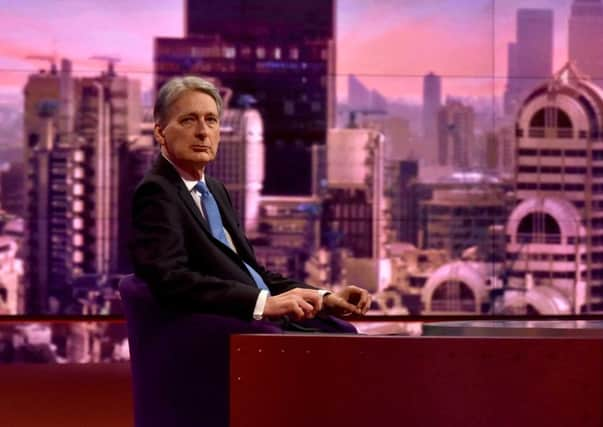Chancellor won't relax grip on spending after years of austerity


Speaking ahead of the Spring Statement tomorrow, the Chancellor said Britain’s debt mountain was still too high and had to be brought down.
“There is light at the end of the tunnel because what we are about to see is debt starting to fall after it has been growing for 17 continuous years.
Advertisement
Hide AdAdvertisement
Hide Ad“That is a very important moment for us but we are still in the tunnel at the moment,” he told BBC1’s The Andrew Marr Show yesterday.
“We have a debt of £1.8 trillion – 86.5 per cent of our GDP. All the international organisations recognise that is higher than the safe level.
“This isn’t some ideological issue. It is about making sure that we have the capacity to make sure that we can respond to any future shock to the economy.
“There will be economic cycles in the future. We need to be able to respond to them without taking our debt over 100 per cent of GDP.”
Economists expect Mr Hammond will announce government borrowing is set to be around £7 billion lower in 2017-18 than had been predicted when he unveils the latest forecasts of the Office for Budget Responsibility (OBR) tomorrow.
The Chancellor, however, made clear that he would not be making any changes to spending in his statement, and said he would continue to take a “balanced” approach to public finances, if there was any further room for manoeuvre.
“What I will be doing is signalling some areas where we want to consult ahead of the Budget in the autumn,” he said.
“We should be very careful about looking at single sets of figures – one quarter or two quarters. We need to look at what is happening sustainably in the economy.
Advertisement
Hide AdAdvertisement
Hide Ad“If there is the flexibility, the space to do something, we will decide in the autumn how we are going to use that but we will continue to take a balanced approach, addressing the debt problem, reducing taxes for hard working families and putting money into our public services.
“It is wrong to say that every penny of capacity has to go paying down the debt but it is equally wrong that every penny should go into additional public spending. We need a balanced approach.”
A leaked report by the European Commission reportedly paints a gloomy picture of the UK’s economy, with lower growth forecasts than those provided by the OBR. The report blames “the squeeze on real disposable incomes” and “stagnation of labour productivity” subdued growth of 1.3 per cent in 2018 and 1.1 per cent in 2019.